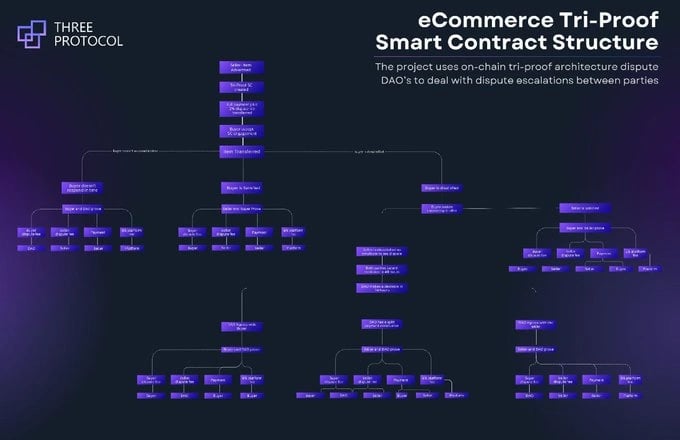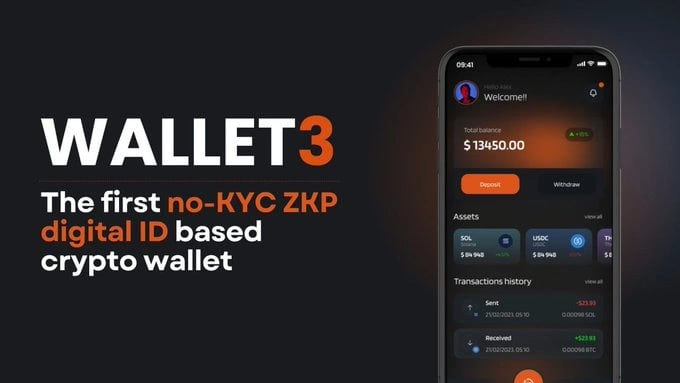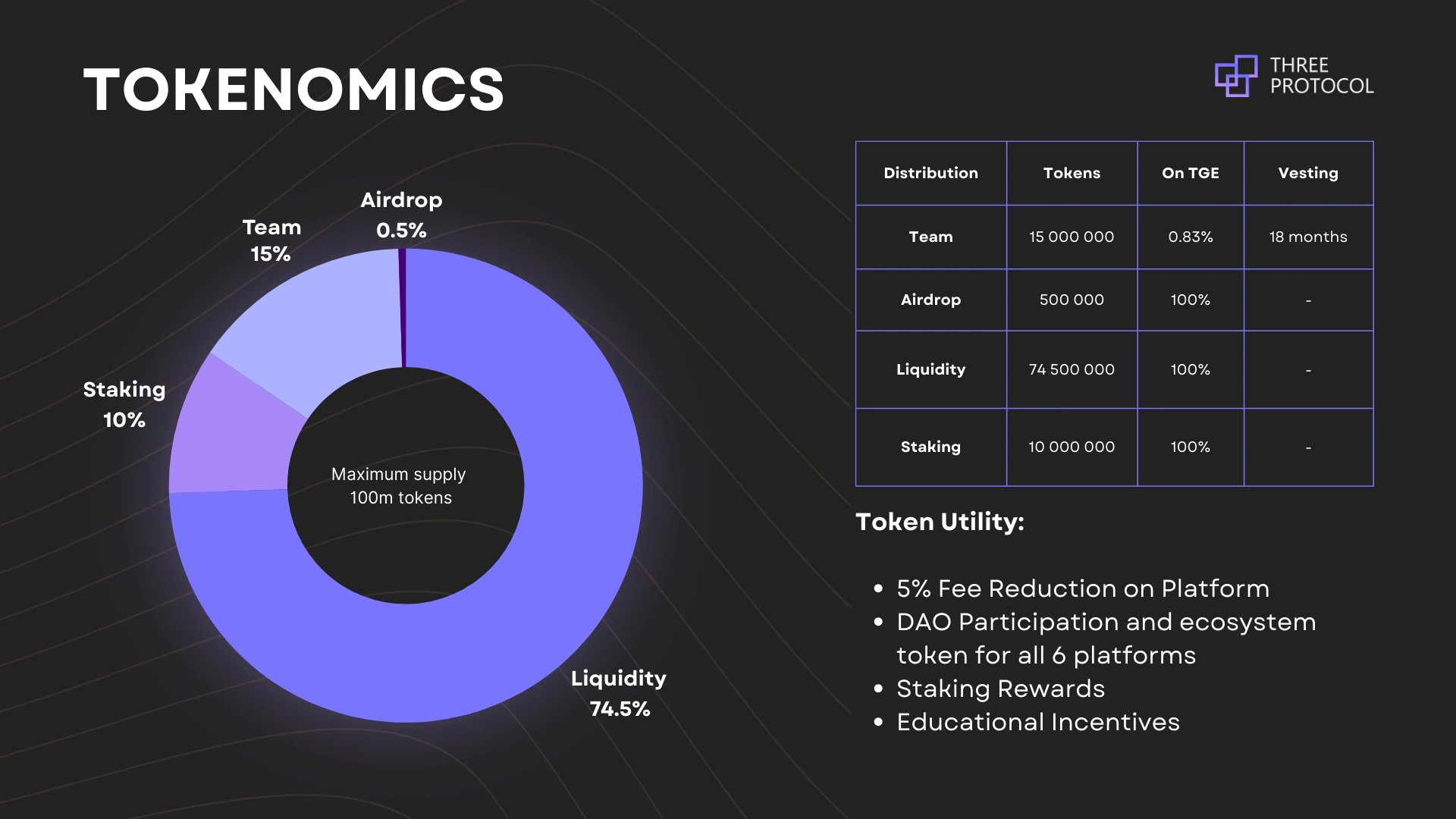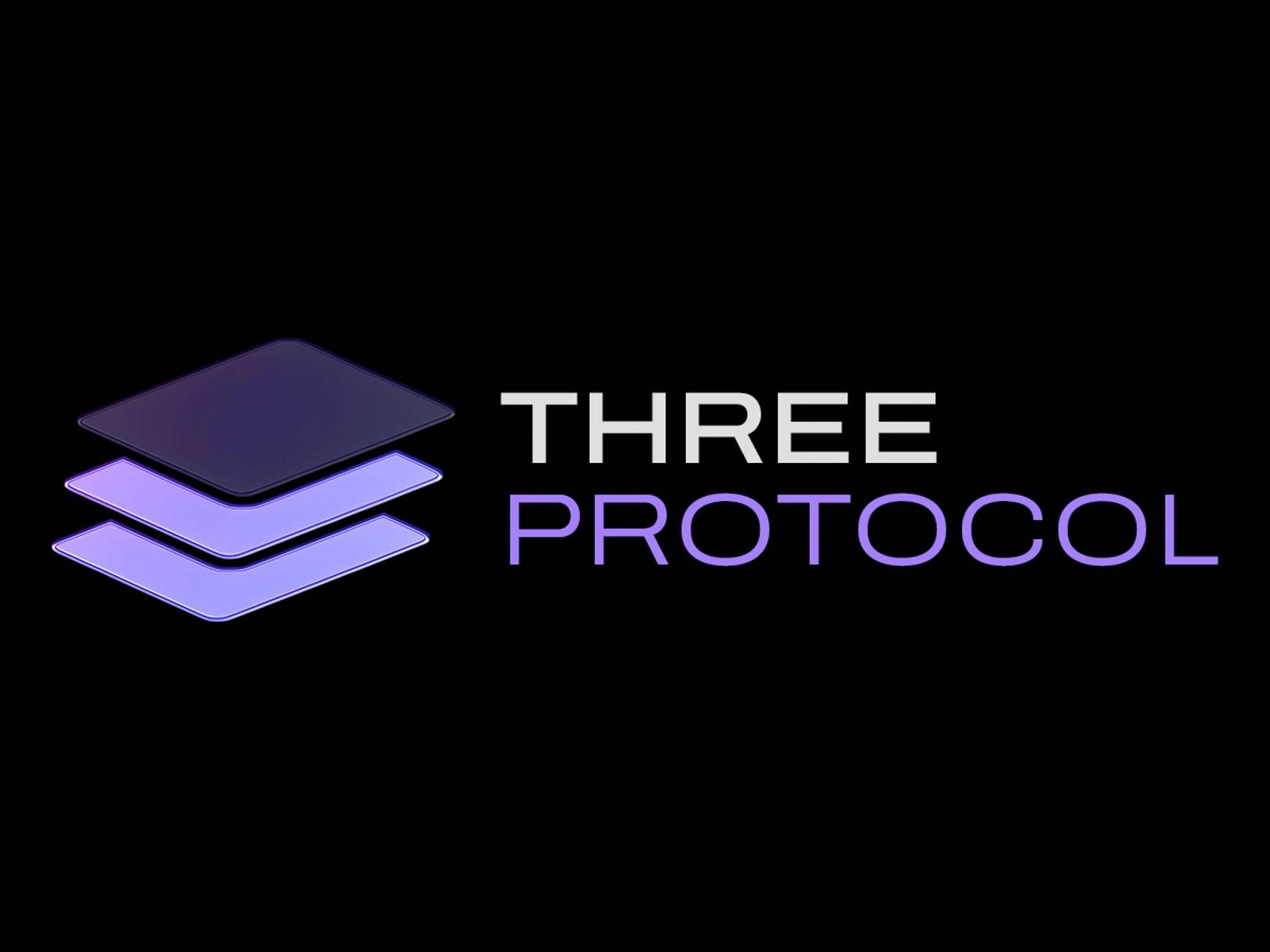위키 구독하기
Share wiki
Bookmark
Three Protocol
0%
Three Protocol
Three Protocol은 전자 상거래 및 실물 자산(RWA) 거래의 포괄성을 높이기 위해 마켓플레이스를 탈중앙화하는 데 전념하는 기본 생태계이며, Tectum 블록체인에 의해 구축 및 인큐베이팅되었습니다. 신경망 AI, 영지식 증명(ZKP) 가명화, Tri-Signature DAO를 포함한 고급 기술을 활용하여 안전하고 포괄적인 생태계를 조성합니다.[1][2]
Three Protocol의 비전은 디지털 상거래에서 포괄성과 개인 정보 보호를 촉진하는 것입니다. 전 세계 사용자가 기존 장벽을 극복하고 감독을 탈중앙화하여 CBDC의 한계를 해결하는 데 도움을 주는 것을 목표로 합니다. 이 프로토콜은 은행 서비스를 이용할 수 없는 개인, 개인 정보 보호를 중시하는 개인 및 블록체인 애호가를 위해 설계되었으며, 모든 사람이 탈중앙화된 상거래에 접근할 수 있도록 노력합니다. Three Protocol의 미래 목표 중 하나는 모든 마켓플레이스를 한 곳에 모아 놓은 모바일 앱을 출시하는 것입니다.[3][8]
2024년 6월 13일, Three Protocol은 첫 번째 탈중앙화된 마켓플레이스의 데뷔를 알리는 Jobs3의 베타 단계를 공개했습니다.[4]
개요
2024년 5월에 출시된 Three Protocol은 일련의 탈중앙화된 마켓플레이스를 구축하는 혁신적인 생태계를 나타냅니다. 이러한 마켓플레이스는 사용자에게 전자 상거래 액세스를 제공하고 전례 없는 방식으로 실물 자산 거래를 촉진하며, 이 모든 것이 최첨단 기술을 통해 달성됩니다. Tectum이 인큐베이팅한 대표 프로젝트로서, UNCX 네트워크의 저명한 블록체인 가속기이자 가치 있는 파트너인 $TET Tectum 블록체인에서 운영됩니다.[1]
간단히 말해서, Three Protocol은 온라인 상거래와 RWA에서 포용성을 가능하게 하기 위해 마켓플레이스를 탈중앙화하는 프로젝트로, 은행 서비스를 이용할 수 없거나, 은행 거래가 중단되었거나, 암호화폐를 사용하는 사람들이나, 개인 정보 보호에 관심이 있고 CBDC 및 인권 침해 법률을 피하고 싶어하는 사람들을 위한 것입니다. 제로 지식 증명(ZKP) 익명성 및 Tri-sig DAO 프레임워크 내의 고급 신경망 AI와 같은 최첨단 기술을 통해 전례 없는 접근성과 개인 정보 보호를 제공합니다.[2]
Three Protocol은 최첨단 신경망 AI 모델을 활용하여 기존 웹2 마켓플레이스에 비해 비교할 수 없는 속도와 정확도로 사용자를 제품, 서비스 및 실물 자산(RWA)과 연결합니다. 온체인 디지털 ID 및 ZKP 익명화를 통합함으로써 Three Protocol은 개인 정보 유출 위험 없이 디지털 경제에 안전하게 참여할 수 있도록 보장합니다. 또한 이 플랫폼은 탈중앙화된 마켓플레이스에서 TriSig DAO 스마트 계약을 사용하여 공정하고 효율적인 분쟁 해결을 보장합니다.
Three Protocol 생태계는 다양한 경제적 요구를 충족하도록 설계된 다양한 탈중앙화된 마켓플레이스로 구성됩니다. Jobs3와 같은 플랫폼은 프리랜서 고용 기회를 촉진하고, 3Bay는 상품 구매 및 판매를 위한 안전한 거래를 지원하여 Fiverr, Upwork, eBay, Amazon, Autotrader 및 Just Eat과 같은 중앙 집중식 플랫폼에 대한 투명한 대안을 제공합니다. 이 모든 것이 안전하고 탈중앙화된 환경에서 이루어집니다.
이 이니셔티브는 중앙 집중식 통제로 인해 발생하는 장벽을 허물고 보편적인 접근성, 사용자 자율성 및 강력한 개인 정보 보호 장치를 보장하는 것을 목표로 합니다. Three Protocol은 금융 포용성과 암호화폐 채택을 촉진함으로써 재정적 또는 지리적 상태에 관계없이 전 세계 개인에게 권한을 부여하여 보다 공정한 글로벌 경제를 조성하고자 합니다.[5]
Three Pillar Technologies
Three Protocol 마켓플레이스 전체를 뒷받침할 세 가지 핵심 기술은 다음과 같습니다.
1. 신경망 AI
Three Protocol은 고급 신경망 AI 기술을 활용하여 전자상거래 및 온라인 마켓플레이스에 혁명을 일으킵니다. 이 최첨단 시스템은 제품 및 서비스 매칭 프로세스를 향상시켜 사용자가 필요한 것을 정확하게 연결하도록 보장하여 마켓플레이스 효율성과 사용자 경험을 최적화합니다.
또한 AI는 자신의 분야에서 뛰어나지만 자신을 마케팅하는 데 어려움을 겪는 프리랜서를 지원합니다. 이력서에서 정보를 추출하고 분석하여 AI는 잠재 고객에게 기술을 효과적으로 홍보하여 잠재적 고용주에게 눈에 띄도록 돕습니다. Three Protocol은 또한 AI를 활용하여 제품 검색 기능을 향상시킵니다. 이 AI는 사용자의 과거 검색에서 학습하고 특정 기준을 적용하여 후속 쿼리를 보다 정확하게 예측하고 일치시킵니다. 예를 들어 Amazon과 같은 플랫폼에서 틈새 제품 품질을 검색할 때 사용자는 종종 광범위한 검색 결과를 접하게 됩니다. Three Protocol의 AI는 이러한 검색을 개선하여 보다 정확하고 관련성 높은 결과를 제공합니다.[6]
Fiverr 및 eBay와 같은 Web2 마켓플레이스는 카테고리 기반 시스템에 의존하여 개인화된 결과가 부족하고 시간이 낭비됩니다. 대조적으로 Three Protocol의 모든 마켓플레이스는 신경망 AI 기술을 활용하여 프롬프트 기반 기술을 통해 검색을 향상시킵니다. 이 AI 기반 접근 방식은 사용자가 플랫폼에서 보내는 시간을 줄여 사용자 경험을 더 간단하고 효율적으로 만듭니다. 고급 AI 모델은 시간을 절약할 뿐만 아니라 전체 프로세스를 개인화하여 최고 품질의 결과를 제공합니다. UX를 개선하고 시간을 절약하며 비용을 절감함으로써 Three Protocol의 마켓플레이스는 보다 사용자 친화적이고 효율적인 경험을 제공합니다.
Three Protocol의 AI 모델 개발은 마켓플레이스를 분산화할 뿐만 아니라 효율성을 크게 향상시키는 데 중점을 둡니다. 목표는 Amazon과 같은 플랫폼의 일반화된 검색 방법에서 벗어나 보다 직관적인 프롬프트 기반 검색으로 이동하는 것입니다. 이 발전은 마켓플레이스를 보다 효과적이고 사용자 친화적으로 만들어 전반적인 경험을 개선하도록 설계되었습니다.[7]
Three Protocol의 조달 매칭 신경망 AI (PMNN AI)
Three Protocol의 조달 매칭 신경망 AI는 고용주의 채용 과정을 간소화합니다. 고용주는 채용하려는 직책을 입력하면 PMNN은 고급 기술을 사용하여 인재 풀을 분석합니다. 그런 다음 고용주의 요구 사항에 따라 최고의 인재를 추천하여 최소한의 노력으로 호환성과 효율성을 보장합니다.
또한 Three Protocols Escrow는 고용주가 서비스 비용을 지불할 수 있는 안전한 방법을 제공합니다. 고용주는 서비스 수수료를 지불하고, 이 수수료는 에스크로에 안전하게 보관됩니다. 자금은 작업이 만족스럽게 완료된 경우에만 해제되어 양 당사자에게 안심을 제공합니다.
PMNN AI는 정교한 신경망 하이브리드 구조를 사용하여 전자상거래 검색을 향상시킵니다. 사용자 쿼리 해석, 이미지 및 리뷰 처리, 검색 사양과 설명 정렬, 쿼리와 제품 기능 매칭, 제품 간 관계 분석과 같은 다양한 작업을 위해 다양한 유형의 신경망을 통합합니다. 이 접근 방식을 통해 사용자는 가장 관련성 높고 정확한 검색 결과를 얻을 수 있습니다.
또한 Three Protocol은 PMNN AI 구조를 무허가 'pay-to-train' 방식으로 제공합니다. 이를 통해 전자상거래 및 마켓플레이스 플랫폼은 하이브리드 신경망 모델을 훈련하여 고급 AI 기술에 대한 접근성을 민주화할 수 있습니다. 훈련 수수료는 플랫폼의 기본 토큰인 $THREE를 사용하여 처리되며, 이러한 수수료의 일부는 이해 관계자에게 반환됩니다. 이 모델은 커뮤니티 참여와 지원을 장려합니다.[2]
2. ZKP 디지털 ID
영지식 증명(ZKP) 유사 익명화는 사용자의 데이터를 비공개로 유지하면서 분산형 플랫폼을 사용할 수 있는 방법입니다. 여기에는 개인 키의 해시를 생성하여 개인 정보를 공개하지 않고도 개인 키에 연결된 블록체인 프로필을 설정하는 것이 포함됩니다. 이 프로필은 사용자가 공유하기로 선택한 리뷰와 같은 공개 데이터를 수집하여 거래에서 익명성을 유지합니다.[1]
이 방법을 통해 사용자는 지갑 활동을 비공개로 유지하면서 분산형 플랫폼에서 고유한 프로필을 유지할 수 있습니다. 지갑 활동을 추적할 수 있는 기존 거래와 달리 ZKP 익명화는 개인 정보를 보호하고 사용자가 공개하려는 정보를 제어하여 투명성과 익명성의 균형을 맞춥니다.
분산형 마켓플레이스에서는 익명성을 유지하는 것이 중요합니다. ZKP를 통해 사용자는 특정 세부 정보를 공개하지 않고 해시를 통해 여권과 같은 개인 데이터의 존재를 증명할 수 있습니다. 이 방법은 사용자 개인 정보를 유지하면서 개인 데이터의 진위성을 확인합니다.
공개 거래 내역에 대한 우려는 ZKP를 통해 해결됩니다. ZKP를 사용자의 지갑과 연결하여 지갑의 자세한 거래 내역을 노출하지 않고도 필수 플랫폼 활동을 캡처하는 새로운 프로필을 생성합니다. 이를 통해 개인 정보 보호를 손상시키지 않고 활동을 확인할 수 있습니다. 사용자는 선택한 정보만 공개하는 플랫폼별 프로필을 만들어 재정 활동을 비공개로 유지할 수 있습니다.
영지식 증명(ZKP) 및 온체인 디지털 ID를 통해 개인은 개인 정보를 공개해야 하는 기존 KYC 프로세스 없이도 안전하고 비공개적으로 Three Protocol 생태계 내에서 상호 작용할 수 있습니다. 이는 특히 은행 서비스를 이용할 수 없는 사람들에게 권한을 부여하여 중앙 집중식 시스템으로 인해 전통적으로 방해받았던 경제 활동에 대한 재정적 독립성과 접근성을 제공합니다. 사용자는 즉시 거래, 최소 수수료 및 민감한 세부 정보를 공개하지 않고도 신원 확인의 이점을 누릴 수 있습니다.[1]
3. Tri-Signature DAO
Three Protocol의 Tri-Signature DAO는 구매자와 판매자 간의 안전하고 공정한 거래를 촉진하기 위한 공정한 중개자 역할을 합니다. 주요 기능으로는 거래 승인, 분쟁 해결, 에스크로 관리가 있습니다.[9]
Three Protocol의 Tri-Proof 스마트 계약은 비수탁형의 효율적인 전자상거래를 위한 궁극적인 솔루션입니다. 이 시스템은 구매자, 판매자, DAO(탈중앙화 자율 조직)의 세 가지 증명자로 구성됩니다. 이 삼자 구조는 두 당사자 간의 온라인 거래에서 발생할 수 있는 모든 잠재적 상황을 적절히 처리할 수 있도록 보장합니다. 이 프로세스는 거래를 실행하기 위해 단 두 개의 제로 지식 STARK(ZKStark) 온체인 증명만 필요로 하여 효율성과 보안을 향상시킵니다.[2]

두 당사자가 마켓플레이스에서 서비스에 동의하면 각 당사자는 세 개의 서명 중 하나가 됩니다. 합의가 원활하게 진행되면 양식에 서명하고 에스크로 스마트 계약에서 자금이 해제됩니다. 그러나 한 당사자가 다른 당사자가 조건을 따르지 않거나, 더 많은 작업을 요청하거나, 서비스 품질에 이의를 제기하는 등 분쟁이 발생하는 경우 문제를 제기해야 합니다. 그러면 세 번째 서명인 DAO 자체가 관여하게 됩니다.
구매자가 만족하지 못하는 경우 DAO는 상황을 평가하고 필요한 증거를 제공하여 구매자 또는 판매자를 지원할지 여부를 결정합니다. 마찬가지로 판매자가 불만족스러운 경우 DAO는 평가하고 필요한 증거를 제공합니다. 이 시스템은 분쟁 해결을 민주화하여 공정성과 효율성을 보장합니다.[10]
제품
Jobs3
Jobs3는 Three Protocol을 기반으로 구축된 선구적인 마켓플레이스입니다. 지리적, 경제적 장벽을 허물고 분산형 플랫폼을 통해 다양한 기회를 가진 글로벌 인력을 연결하여 고용 환경에 혁명을 일으킵니다. 고급 신경망 AI를 활용하여 Jobs3는 작업 매칭 및 거래를 용이하게 하고 사용자 지침을 보장하며, No-KYC ZKP 가명성 기능은 개인 정보 보호 및 보안을 보장합니다.[11]
Tri-Signature DAO 거버넌스 및 암호화폐 거래를 통해 Jobs3는 디지털 경제에서 프리랜서, 직원 및 고용주에게 권한을 부여하는 포용적이고 실력 기반의 생태계를 조성합니다.
Three Protocol의 첫 번째 마켓플레이스이며 Fiverr 및 Upwork와 같은 플랫폼에 대한 분산형 대안을 제공합니다. 사용자는 No-KYC 온체인 분산형 디지털 ID를 사용하여 $THREE(및 기타 암호화폐)로 거래할 수 있습니다. Jobs3는 최초의 플랫폼으로서 기존 고용 플랫폼에 대한 분산형 대안이 되는 것을 목표로 안전한 에스크로 서비스, 효율적인 조달 및 원활한 암호화폐 거래를 제공합니다.[12]
Jobs3는 판매자에게 10%, 구매자에게 5%의 서비스 수수료를 부과합니다. 이는 Upwork 및 Fiverr에서 볼 수 있는 20-40%의 수수료보다 훨씬 낮습니다. 이 모델은 수익 창출과 경쟁력 있는 가격 책정의 균형을 맞추는 것을 목표로 하며, 시장 매력도를 높이기 위해 판매자 수수료를 10%로 줄입니다.[2]
Wallet3

3Bay
3Bay는 신속하고 공정한 리뷰에 중점을 둔 경매 및 판매를 위한 탈중앙화 플랫폼입니다. 2024년 8월에 출시될 예정입니다. 전통적인 금융 및 개인 정보 보호 제약을 제거하는 탈중앙화 플랫폼을 도입하여 온라인 경매 및 판매 환경을 변화시키고 있습니다. No-KYC ZKP 유사 익명성을 통해 3Bay는 사용자 신원을 보호하고 거래 익명성을 유지하면서 안전하고 효율적인 거래를 보장합니다.
이 플랫폼은 Neural Network AI를 활용하여 경매 프로세스를 간소화하고 사용자에게 사용자 친화적인 경험을 제공합니다. 3Bay의 거버넌스는 Tri-Signature DAO를 중심으로 구성되어 암호화폐 기반 거래를 통해 투명성, 포용성 및 민주주의를 촉진합니다.
기존 온라인 마켓플레이스는 종종 리스팅 수수료와 최종 판매 가격의 일정 비율을 수수료로 부과합니다. 예를 들어 eBay는 75센트의 리스팅 수수료와 13%의 최종 가치 수수료를 부과합니다. 대조적으로 3Bay는 최종 판매 수수료를 7.5%로 낮추어 경쟁 우위를 제공하는 것을 목표로 합니다.[2]
3Taxi
Uber와 같은 서비스의 탈중앙화된 대안으로, 초기 리뷰에 대한 선불 결제 모델을 특징으로 합니다. 2024년 12월에 출시될 예정입니다.
Uber와 같은 기존 서비스에서 부과하는 26%의 수수료와 비교하여 3Taxi는 수수료를 10%로 줄입니다. 이 전략적 가격 책정은 서비스 제공업체에게 더 경제적인 대안을 제공하여 시장을 혼란에 빠뜨리는 것을 목표로 합니다.[6]
Auto3
자동차 거래를 전문으로 하는 탈중앙화 마켓플레이스입니다. 2024년 10월에 출시될 예정입니다. Autotrader와 같은 플랫폼은 일반적으로 리스팅당 약 100달러를 부과합니다. 반면 Auto3는 이 비용을 절반으로 줄여 약 50달러로 책정할 계획입니다. 이 접근 방식은 더 낮은 비용으로 판매자를 유치하도록 설계되었습니다.
3Eats
Grab, Doordash, Deliveroo와 같은 플랫폼과 경쟁하도록 설계된 탈중앙화 음식 배달 서비스입니다. 출시 예정일은 2025년 2월입니다. 일반적으로 식당에 약 30%의 수수료를 부과하는 Deliveroo와 같은 음식 배달 서비스와 비교하여, 3Eats는 수수료를 10%로 설정하여 이를 크게 낮출 계획입니다. 이 전략은 더 많은 식당을 플랫폼으로 유치하는 것을 목표로 합니다.[13]
$THREE 토큰

$THREE 보유자는 KYC 없이 위의 모든 마켓플레이스에서 자유롭게 거래할 수 있습니다. 좋아하는 자동차나 식사를 구매하는 데 암호화폐를 사용하고, 모든 플랫폼에서 $THREE를 사용하여 더 낮은 수수료, 더 빠른 결제, 독점 할인의 혜택을 누리세요.
$THREE 토큰은 중앙화 거래소와 탈중앙화 거래소에서 거래할 수 있으며, 여기에는 MEXC와 Uniswap이 포함됩니다.[15]
Three Protocol 팀 토큰(공급량의 15%)은 감사된 공개 Real Floki Inu 보관소에 18개월 동안 잠겨 있습니다. 약 75만 개의 $THREE 토큰도 성공적으로 소각되었습니다.[16][18]
암호화폐 거래 플랫폼인 MEXC는 2024년 3월 14일에 $THREE를 현물 거래 플랫폼에 상장한다고 발표했으며, 활성 거래 쌍인 THREE/USDT를 특징으로 합니다.[17]
토큰 할당
- 팀 할당 (15%): 핵심 팀을 위해 예약되었으며, 장기적인 지원과 커뮤니티 관심사와의 연계를 장려하기 위해 18개월에 걸쳐 선형적으로 해제됩니다.
- 스테이킹 인센티브 (10%): 스테이킹 활동에 대한 보상을 제공하여 네트워크 보안을 강화하고 시장 변동성을 줄이며 토큰 가치를 지원합니다.
- 공개 제공: 사전 판매 단계에서 초기 채택자 및 기여자들을 대상으로 초기 배포 및 커뮤니티 구축을 지원합니다.
- 유동성 공급 (75%): 유동성을 보장하며, $THREE 토큰에 대한 안정적이고 접근 가능한 시장에 대한 프로토콜의 약속을 강조하여 원활한 거래 및 교환을 용이하게 합니다.[15]
유틸리티 및 애플리케이션
- 수수료 감면: $THREE 토큰으로 거래하는 사용자는 5%의 수수료 감면을 받아 네이티브 토큰 사용을 장려하고 유통을 촉진합니다.
- 거버넌스 참여: 토큰 보유자는 거버넌스 권한을 가지므로 의사 결정 과정에 참여할 수 있으며 민주적이고 사용자 중심적인 생태계를 조성합니다.
- 스테이킹 보상: 사용자는 토큰을 스테이킹하여 보상을 얻고 경제 활동에 기여하며 네트워크 안정성을 지원하면서 추가 수입을 확보할 수 있습니다.
- 교육 인센티브: 'Train-to-earn' 이니셔티브는 교육 콘텐츠에 참여하는 사용자에게 보상을 제공하여 정보에 입각한 커뮤니티를 구축하고 블록체인 및 Three Protocol 생태계에 대한 이해를 향상시킵니다.[15][6]
세 개의 프로토콜 파트너
- UNCX 네트워크
- 크레오 엔진
- 카멜롯 프로토콜
- ShillGuard
- DDOChain
- Fuxion Lab
- DeSui
- Domus AI
- Orbler
- OX.FUN
- Micro3
- MindAI
- Uno Re DAO
- Bitgert
- SolarX
- Octavia
- Versus-X
- Dione 프로토콜[3]
팀
Three Protocol 팀은 고도로 숙련된 자문위원회의 지도를 받는 전문가들로 구성되어 있습니다. 많은 자문위원들이 CrispMind 및 인큐베이팅 주체인 Tectum 프로젝트 참여를 통해 블록체인 및 탈중앙화 분야에서 광범위한 배경을 가지고 있습니다.
- Grant Robertson - 공동 창립자 겸 COO
- Louie Rice - 공동 창립자 겸 CBDO
- Brendan Young - 창립자/최고 운영 책임자
- Sean Munn - CMO
- Abdemoula Selmani - 프론트 엔드 개발자
- Tomislav - 백 엔드/AI 개발자
- Ihor - 스마트 컨트랙트 개발자[19]
어드바이저
- Russell Sean — Tectum의 CEO입니다.
- Trevor Mccarter — Tectum의 COO입니다.
- Andrew Erikshivilli — Tectum의 CMO입니다.
- John Dajci — TMS.
- Tawqeer Gilkar — EmChain.[20]
로드맵
2024년 2분기
- Tri-Sig Rust/Solana 스마트 컨트랙트 V1 코드 (2024년 4월 28일)
- $THREE 토큰 출시 (2024년 4월 29일)
- Jobs3 포털 V1 (2024년 6월 11일)
- Tri-Sig Rust/Solana 스마트 컨트랙트 감사 (2024년 6월 10일)
- Tri-Sig Rust/Solana 스마트 컨트랙트 배포 (2024년 5월 31일)
- $THREE 스테이킹 (2024년 6월 3일)
- DAO Rust/Solana 스마트 컨트랙트 V1 코드 (2024년 7월 15일)
- 신경망 AI 매칭 V1 (2024년 7월 31일)
- AMA: Crypto Moonshots (2024년 5월 7일 15:00)
- AMA: USA Crypto (2024년 5월 13일 21:00)
- AMA: The Chase Reviews (2024년 5월 14일 13:00)
- AMA: Astronaut Lounge (2024년 5월 15일 14:00)
- AMA: Three Protocol + Guest Speakers (2024년 5월 16일 14:00)
- AMA: Asteroid Ventures (2024년 5월 17일 15:00)
- AMA: WEB3 NATION (2024년 5월 20일 08:00)
- AMA: Hela Lab Spaces (2024년 5월 22일 14:00)
- AMA: Three Protocol with Fuxion Labs (2024년 5월 23일 15:00)
- AMA: Mind AI (파트너십) (2024년 5월 24일 16:00)
- AMA: ShillGuard (파트너십) Spaces (2024년 5월 27일 15:00)
- AMA: Alt Crypto Gems (2024년 5월 28일 13:00)
- AMA: Adam's Lounge (2024년 5월 31일 14:00)
- AMA: Coin Launch Lounge (2024년 5월 31일 16:00)
- AMA: GameGPT Mega Spaces (2024년 6월 3일 14:00)
- AMA: Mario Nawfal's Roundtable (2024년 6월 4일 20:30)
- AMA: Three Protocol with HASH AI (2024년 6월 6일 15:00)
- AMA: Cluster Protocol AI panel (2024년 6월 7일 15:00)
- AMA: WCT (Jobs3 출시일) (2024년 6월 11일 14:00)
- AMA: UNXC (2024년 6월 12일 14:00)
2024년 3분기
- 3Bay 웹 플랫폼 (2024년 8월 12일)
- 3Bay 로그인 포털
- 3Bay DAO 수정
- DAO Rust/Solana 스마트 컨트랙트 감사 및 배포
- Tri-Sig Tectum 스마트 컨트랙트 V1 코드
- Tri-Sig Tectum 스마트 컨트랙트 감사
- Tri-Sig Tectum 스마트 컨트랙트 배포
- 스테이킹 컨트랙트 V1 코드 (플랫폼 보상 포함)
- 스테이킹 컨트랙트 V1 감사
- 스마트 컨트랙트 보증 구현
2024년 4분기
- Auto3 웹 플랫폼 (2024년 10월 1일)
- Auto3 로그인 포털
- Auto3 DAO 수정
- DAO Tectum 스마트 컨트랙트 V1 코드
- DAO Tectum 스마트 컨트랙트 감사
- DAO Tectum 스마트 컨트랙트 감사 배포
2025년 1분기
- 3Eats 웹 플랫폼 (2025년 2월 7일)
- 3Eats 로그인 포털
- 3Eats DAO 수정 사항.[21]
잘못된 내용이 있나요?
